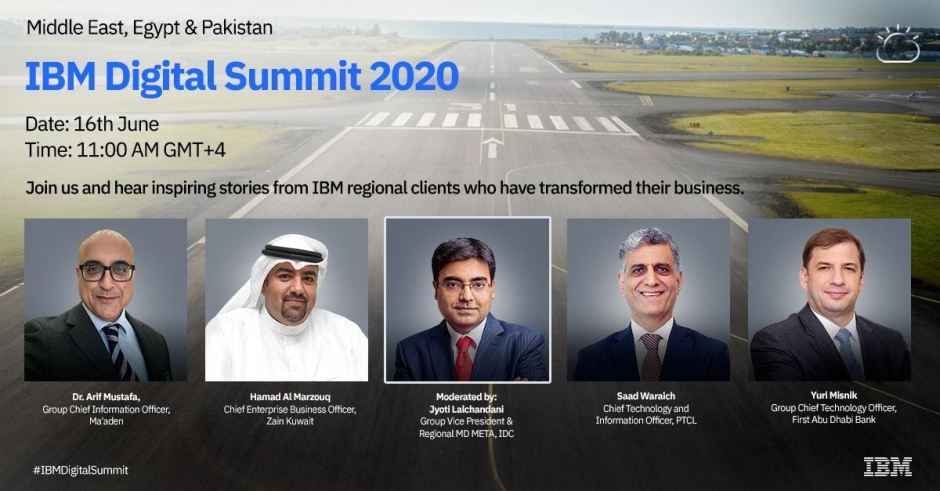Ever since COVID-19 pandemic began, we have witnessed massive transformation in organizations, whether in providing flexibility for people to work from home or to revisit their existing processes to adapt in the current situation.
During IBM Digital Summit 2020 online session, it was mentioned that how this pandemic has forced our hands to re-evaluate and re-prioritize the projects at least, in the short and medium terms. Businesses such as e-commerce, telecommunication, FMCG, banking etc. are required to undergo the necessary transitions in order to survive. So, in all this chaos, with so many unanswered questions and a barrage of challenges at every corner, how will the business-critical situation in the country improve with Artificial Intelligence? It is interesting how these businesses are leveraging technology and adopting it through data analytics and AI.
When we talk about AI, a lot comes to mind as to how it will work, along with its accessibility and costs involved. It is pertinent to mention here that most of the companies have legacy systems in the developing countries and thus it is a challenge to upgrade their systems to the new technologies like AI.
We see companies like PTCL going through a quick transition to the new normal. Being a leading ICT player in the country, it has been at the forefront when it comes to providing connectivity from Karachi to Khyber and Gilgit to Gwadar covering small towns to large metropolitan cities.
At the session, Saad Muzaffar Waraich, Chief Technology & Information Officer, PTCL, talked about PTCL network and the drastic increase in its traffic as soon as work from home was implemented. To bring down the traffic and ease the network congestion, other telecom operators including in the Western Europe reached out to Facebook, Netflix and Google to downgrade their video streaming quality.
The company had been investing in its network and we have seen a lot of initiatives especially during COVID-19, where they maintained the connectivity throughout Pakistan.
Coming back to the session, which was focused on how PTCL has been able to maintain connectivity and provide services to its customers by leveraging AI to support Customer Happiness Index (CHI). The company made calculated predictions about the network by using smart technology to improve the services.
With a well-thought-out strategy to improve customer satisfaction, the company in collaboration with leading tech giants like IBM has conducted Design Thinking workshops and trainings. The objective was to come up with an idea of how exactly AI will work for PTCL by keeping the focus on customer complaints and reducing the mean time to resolve those complaints. Interestingly, we have learnt from the top management that the key learning from these workshops is to put the customer in the center of it all.
Obviously, it was not rocket science to figure out what was the major factor causing inconvenience to the customers. The company built a very interesting model using all the variables at play and came up with a customized CHI that came in handy to clearly see the correlation between customer satisfaction and churn.
It also identified that the key factor that predominantly affected the customers was stability of the connection.
With the help of an integrated AI Customer Happiness Index, the company no longer has to go to every customer to know their complaints as all the information is available online. The model would come up with a right statistical analysis to determine whether the customer is happy or not. Interestingly, the outcome of the program was positive, and we have learnt that the company was able to reduce its mean time to repair and have brought it to less than 24 hours, which is quite impressive.
During COVID-19, like many other organizations, PTCL has been working smartly to reduce its employees’ exposure to customers and network systems, meanwhile, upgrading its network throughout Pakistan, which is contributing to more happier customers than they had a year ago.
The company using AI, has been working on a model based on use case for an early warning system to detect any outage in the network elements before it goes down. With the use of available data, the company can determine what elements of the network are critical and essential, thus, building backup power for the network to avoid outage. This automated system is another use for AI as the company has been able to bring down the number of times its employees have to go out with a portable genset, to replace batteries in order to increase network availability.
The industry expert shared that every process has been fast forwarded due to this pandemic. The mere concept of auto feasibility whenever there was a new order or complaint as a fixed operator, the company staff had to go out every time, check feasibility manually and lay wires or an optical fiber running to the customer premises. So, the process has been improved as the company gets an order, they are able to determine whether they will be able to fulfil the order with auto or remote feasibility. Acceleration in such projects with right use of technology and implementation of Customer Happiness Index, the company has seen real improvements in last couple of months both in terms of quality of service, reduction in costs and an improved customer base.
It goes without saying that the key to a prosperous business is a happy customer. With such a massive customer base and vast network, PTCL is adopting to the new normal with ease as the company has built a solid IT foundation and is steadily moving on the path of service excellence.
In the end, only those companies that are willing to accept the new normal and stay focused are going to be the frontrunners in keeping the economy stable and survive the impact of the pandemic.











